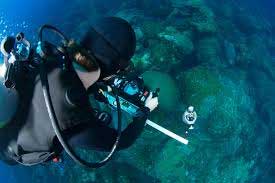If you’ve ever wanted to feel like a fish, diving is the sport for you! Whether you want to dive in (get it?) as part of a fun addition to your tropical vacation or you’d like to take up diving as a new hobby, your childhood dream of becoming a mermaid can finally come true. By the time you’re preparing for your first dive, you should have already completed your diving certification course and gotten comfortable with common safety regulations and diving best practices. So, why not get off to the best start by taking a look at ten of our top tips for your first-ever dive.
Be One with the Waves
 Weather can have a tremendous impact on diving conditions. If it’s a stormy day or the wind has caused the waves to become high and choppy, it might be difficult to reach a safe and stable point of immersion when you jump in. You should also be mindful of underwater currents which can pose significant danger to divers if they get caught up and unable to escape. So, if it looks like a rough day, play it safe— just come back another day and try again.
Weather can have a tremendous impact on diving conditions. If it’s a stormy day or the wind has caused the waves to become high and choppy, it might be difficult to reach a safe and stable point of immersion when you jump in. You should also be mindful of underwater currents which can pose significant danger to divers if they get caught up and unable to escape. So, if it looks like a rough day, play it safe— just come back another day and try again.
Listen to Your Heart
Okay, that was a very Little Mermaid thing to say. But corniness aside, it’s important to be attentive to your own instincts while diving. If you’re nervous about anything or have unanswered questions and concerns, once again, it’s better to err on the side of caution. Keep in mind that you won’t be able to communicate with your diving buddy while underwater and that things can get pretty tricky if you freeze up or have an anxiety attack. So, if you’re hesitant, either discuss your concerns with your dive instructor or simply wait until you feel more comfortable.
Breathe
 Even though you’ve passed your diving certification test by this point, breathing underwater might not feel totally natural to you yet. So, if you’re feeling a bit, well, not like a fish, you can calm these anxieties by reminding yourself that you literally have an air supply attached to you, so it’s okay to breathe normally. Although you might be tempted to freeze up or try to conserve your oxygen, remember that that isn’t necessary. In fact, failing to breathe normally will cause more complications, so do your best to think fish-y thoughts and breathe just like you would on land.
Even though you’ve passed your diving certification test by this point, breathing underwater might not feel totally natural to you yet. So, if you’re feeling a bit, well, not like a fish, you can calm these anxieties by reminding yourself that you literally have an air supply attached to you, so it’s okay to breathe normally. Although you might be tempted to freeze up or try to conserve your oxygen, remember that that isn’t necessary. In fact, failing to breathe normally will cause more complications, so do your best to think fish-y thoughts and breathe just like you would on land.
No Touching!
This is probably the hardest rule to master because, honestly, if you see a cool fish on your dive, who wouldn’t want to touch it?? However, it’s important to remember that, no matter how much we might want to be, we’re not Steve Irwin and contrary to what we see in ocean adventure vlogs, as a general rule, we’re not meant to physically interact with the marine life we encounter on our dives. Although marine biologists or divers who are experienced in guided ocean interaction tours can give you more information on safe methods for getting up close and personal with your fishy friends, a good rule of thumb is to look but don’t touch.
Take it Slow
If you’re getting the impression that caution is the main focus of our top tips, you’re catching on. We don’t mean to be a buzz kill; we’re just here to keep you safe. So, once again, we advise that you play it safe on your ascent and avoid shooting out of the water like a dolphin. Rising too quickly can lead to decompression sickness and possibly even burst your lungs, so make an attempt to rise more slowly than the bubbles that come out every time you breathe. Because the bubbles will rise quickly, staying a good few paces behind them will help you adjust your speed to a safe level.
Buddy Up
Although diving alone isn’t illegal, it’s very ill-advised and definitely shouldn’t be happening on your first dive. In fact, any ethical diving instructor will tell you that, no matter how experienced you are, diving on your own is never a safe or advisable idea. So, for starters, make sure you always have a diving buddy. And then once you have one, make sure you’re being a good buddy in return by keeping an eye out for your partner through the course of your dive. You may not be able to communicate much underwater, but you can still be there for each other if trouble arises. So, be the kind of diving buddy you’d want to have and keep an eye out for your partner’s health, diving level, and equipment status.
Always Double Check
This might be the last tip on our list, but it is by no means the least! Checking your equipment before you get in the water is critical for your safety and that of your partner, so never assume that everything is working properly without giving it a test first.
In short, while there are a few risks associated with diving, they don’t have to keep you from fully enjoying the experience. So, to play it safe and have fun, just follow these tips for a happy, healthy first div

